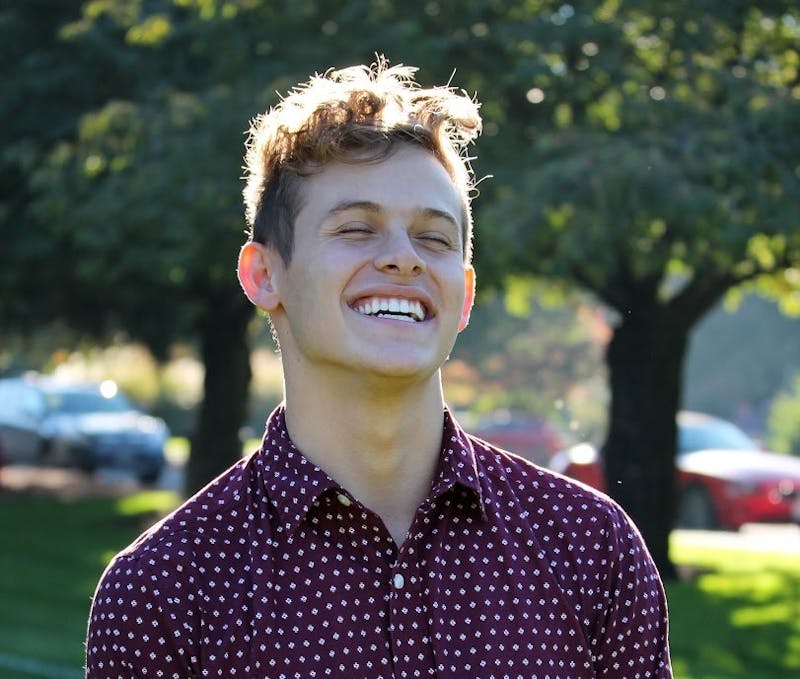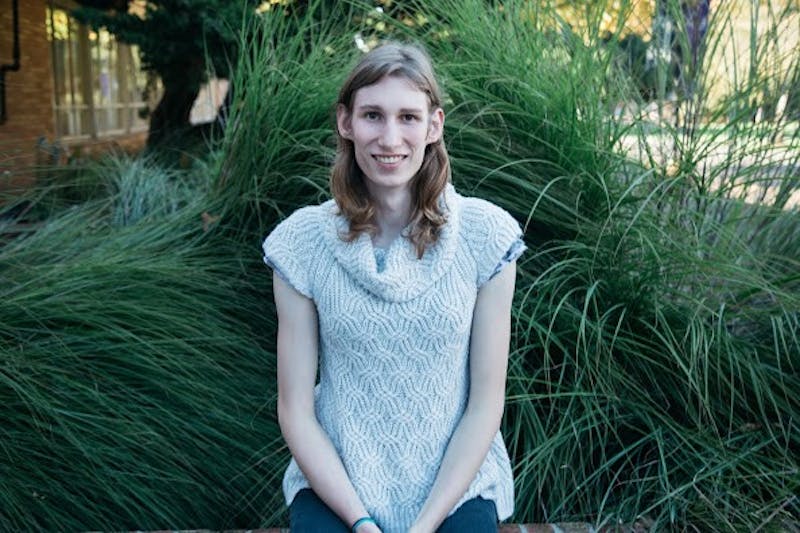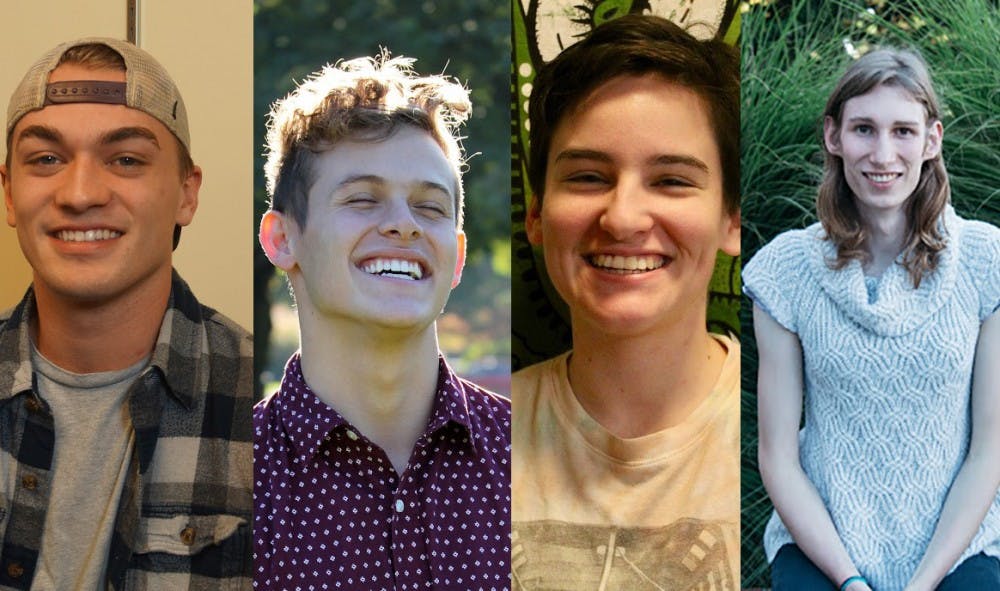The stereotypical hallmark of the LGBTQ identity has often been an extravagant or dramatic coming out story. But that isn’t always how it is. There is no one right way to be LGBTQ. Not in looks, life experiences, gender or sexuality.
According to the Human Rights Campaign, 2016 marks the 28th anniversary of National Coming Out Day, which first began “as a reminder that one of our most basic tools is the power of coming out.”
The Human Rights Campaign highlights the importance of coming out and sharing stories for both the closeted and questioning, and for those who are potential allies saying, “Every person who speaks up changes more hearts and minds, and creates new advocates for equality.”
In honor of the 28th anniversary of National Coming Out Day, six LGBTQ University of Portland students opened up about their lives, and shared experiences of processing their identities and the evolution of their coming out.

Abby Tuthill, sophomore, mechanical engineering major, lesbian
When Abby Tuthill was in middle school she would sneak to watch The Ellen Show.
“My dad wouldn’t let me watch it because he hated gay people,” she said, frustrated. “Ellen was a huge part of me accepting my gayness, she was like the one thing that made me happy!”
Although Tuthill noticed her lack of attraction to boys in middle school, a chaotic home life deterred her from processing her sexuality until she was in high school and found out her best friend was also a lesbian. Tuthill spent a long time trying to convince herself that she liked boys, but as a sophomore in high school had a moment of self realization: “Oh crap, I think I’m gay!”
Tuthill first came out to her best friend and two teachers she was close with. Then, toward the end of her senior year, her mom questioned her during a conversation about prom shopping, and Tuthill responded, “Yes mom, I am gay.” Her mom was very slow to warm up to the idea of her daughter being gay, Tuthill says that it felt like her mom wanted to hide it from friends and family at first, even though she says, “Everyone had their speculations about Abby!” When they did finally find out, almost all of them were accepting and supportive of her.
She appreciates her mom’s support, but says she doesn’t know what would have happened if she had come out to her dad as a lesbian before he passed away, when Tuthill was in the eighth grade.
People speculating about her sexuality is something that Tuthill, a sophomore mechanical engineering major, is now used to, having been openly gay for three years, but being misgendered is still something she struggles with on a daily basis at UP. Tuthill has short hair and buys most of her clothes in the men’s section. Most of her bad experiences have happened in restrooms, when women will walk in, see her and walk out to double check the gender sign on the door.
“It hurts,” Tuthill said of the first times she was misgendered. But now it is a regular occurrence for girls to walk into the bathroom and look at her as though they are ”really confused,” often times they even lean their head back out the door to double check that there is a female symbol, that they are in the correct bathroom.
She is called “young man,” “sir” and is regarded with pronouns that do not match her gender on a regular basis, both on and off The Bluff. But she says she is used to it now, and tries not to let it bother her.
Tuthill is involved in a variety of ways on campus. She credits her feeling comfortable at UP to the Active Minds and Gay Straight Partnership clubs. She enjoys being a part of Active Minds because it reminds her that people care, that she is loved no matter what and that even though people may be struggling with different things, no one’s life is perfect. She attends the Gay Straight Partnership to spend time in a fun atmosphere with people who are like her in a non-judgemental space.

Michael Gallagher, sophomore, biology and spanish major, gay
Michael Gallagher was 12 years old in Gadsden, Ala. when he first put a name to the way in which he was feeling different. Gallagher is gay. He was home schooled, and spent all his time with his family: his parents, his twin brother and four younger siblings. He grew up in a conservative Catholic household, and when he identified this feeling, he looked to the church for answers.
Gallagher’s mom “found out” he was gay when he was 14. In his search for answers, he stumbled upon a website that helps people come out, and was reading it in the living room when his mom noticed and started to question him. “You’re gonna hate me,” he said to her again and again, and when she told him she wouldn’t, he said, “I think I’m gay.” She asked him to clarify, and he followed up with, “No, mom, I know I’m gay.”
Once his parents calmed down, they sat him down and told him his sexuality was “a choice”. After a period of self loathing and a battle with depression, Gallagher was sent to a religious counselor by his parents to discuss the conflicts between homosexuality and the church. He grew very angry with his parents for their lack of acceptance, and their relationship was strained for several years.
But the summer before he started his first year at UP, his mom said to him, “Michael, if you do get a boyfriend, can you tell me about it?”
Gallagher remembers this conversation and can see now that his parents have made progress in terms of their acceptance and understanding of his full identity.
“Slowly, they came around,” he said.
Gallagher tears up when he talks about his experience on National Coming Out Day last year, a Facebook post he made, and an emotional phone call he received from his parents afterward in which they expressed how proud they are of him for living his truth, and how much they love him.
“They told me, ‘I am so proud of you, your courage is what I look up to,’” Gallagher said.

Michael Roberts, sophomore, mechanical engineering major, bisexual
When people ask Michael Roberts about his sexuality, he always says, “I want to be with someone who makes me happy.” Roberts first noticed in middle school that he was experiencing attraction to both boys and girls, and today identifies as bisexual.
Roberts was bullied throughout middle school for his sexuality, and he internalized the homophobia surrounding him by repressing his attraction to boys. When he got to high school and started coming out to his friends, he was met with acceptance and support, despite worries about his peers’ reactions at the conservative Catholic school he attended. For Roberts,
“It was a very tough time trying to figure out who I was,” Roberts recalls, “and at the same time, not accepting it.”
During Winter Break his freshman year at UP, Roberts came out to his mom when she began to question his lengthy Facetime calls with a guy he was interested in then.
“This is a thing, I am bi,” he told her without hesitation.
Roberts says she she was calm and accepting in her reaction. He then told his dad who reacted similarly. Roberts says he is grateful that neither of his parents felt the need to make a big deal about his sexuality. Once he finally told his parents, he said, “I just felt so much freedom.”
18-year old man in the College of Arts and Sciences, bisexual
An 18-year-old bisexual man in the College of Arts and Sciences has had a somewhat different experience on The Bluff.
This man is the youngest of three brothers, and grew up being the target of a lot of jokes, many pertaining to his femininity. Although this man had a rocky journey in learning to accept himself, especially with the homophobia from the people he loved, he is out on campus. He is open about his sexuality to his friends and feels no shame in that arena.
But in his dorm room, things are different. Although he says he likes his roommate, he does not feel comfortable being honest about his bisexuality around him because his roommate has made remarks suggesting that he would be fine with it if someone were gay, as long as he didn’t have to live with them.
The 18-year-old man is not gay, he is bisexual, and currently has a girlfriend on campus. But because of the homophobia of this roommate, he feels he cannot be his true self in his dorm room.

Talia Liebscher, junior, psychology major, transgender woman, lesbian
Talia Liebscher began to question her gender identity when she came to The Bluff as a freshman, and was “exposed to new thoughts.” Because of the societal transphobia she internalized as she grew up, she “rejected the label of trans” and identified as nonbinary for nearly a year. Liebscher did not come out as a transgender woman until the spring of her sophomore year, and has embraced presenting as her true feminine self this fall as a junior.
Liebscher came out to her partner before she started shifting her presentation from more masculine to more feminine in nature. Her partner was a driving force in giving Liebscher the confidence and courage to be herself. Her friends were next, and although Liebscher was anxious about how they might react, especially while planning for housing, she says they were all very supportive and treated her trans identity as a natural part of her. After she told her friends, Liebscher asked her professors to use the name that matches her gender and to regard her with the correct pronouns.
Liebscher came out to her family somewhat unintentionally. When her mom found the wrapping of some women's clothing she had ordered online, she confronted Liebscher about being a “transexual.”
“No, mom. I’m transgender,” Liebscher replied. “This is who I am.”
Liebscher said it has been very difficult for her parents to adjust, and their relationship has suffered because of it. Liebscher says her mom is now very accepting, and her dad is trying, though he struggles to always get her pronouns and name correct.
During her time at UP, Liebscher has been very active in the music program. She plays the clarinet and the oboe, and previously sang in the choir. Liebscher had enjoyed participating in choir, and was a part of the tenor section, which is typically made up of men. This resulted in her often being misgendered, as well as being unable to wear a womens choir dress in performances. Unfortunately, because of her experiences, she is no longer participating in choir on campus.
In coming back to school this fall, Liebscher has been called the wrong name less than a handful of times. Although she says no one has been outwardly rude to her about her gender, she has noticed that people she used to know will fail to make eye contact with her, or say hi, which she believes may be out of fear or because people are still processing her gender transition.
Alex Robbins, junior, history major, agender, pansexual
“Mom, hey I have something to tell you — I kinda have a girlfriend!”
Alex Robbins, now a junior history major at UP, first came out to their mom as pansexual when they were a junior in high school. They discovered this aspect of themself in middle school when they started googling “elements of attraction” in the wake of their first girl crush. Robbins identified strongly with pansexualiy’s definition — attraction “regardless of gender” — and adopted this label for themself when they were just 13.
The processing of their gender identity, however, was a longer process.
“Around my senior year of high school I started realizing that I didn’t fully identify with being a woman,” Robbins said. “(I met lots of people on Tumblr who) had the same feelings as well, and they had these different identities, and I kind of experimented with different identities for a while.”
Although Robbins was assigned female at birth, they identify as “agender,” which is a label they are comfortable with because they feel “like a blank canvas” and are able to present themself in more masculine or more feminine ways.
Although Robbins identifies as agender, they are adamant about the fact that they are still learning about their identity. “It’s still a work in progress,” Robbins said of their parents getting used to referring to them as the correct gender, and of getting to know themself and accepting who they truly are.
When speaking about their coming out experience, Robbins got emotional about a fear of negative backlash, describing coming out on Facebook as “horrifying.” Because of the transphobia they had internalized growing up, they were worried about getting negative comments and being unfriended online, among other things they feared might happen at school. When Robbins did come out as agender on Facebook during their sophomore year at UP, they were met with only support.
Advice to Pilots who may be closeted or questioning:
When asked what advice they would give to the closeted and questioning students on UP’s campus, all six students highlighted the importance of trusting your friends and letting them be your support system. Whether that means starting with one person you trust and confiding in them that you aren’t entirely sure about your gender or sexuality, or telling all of your friends at once — telling at least one person helps. Once it is not a complete secret anymore, they said, once you have someone to share this experience with, the burden decreases.
Roberts emphasized the importance of letting yourself be unsure sometimes.
“It doesn’t matter who you end up with as long as that person makes you love life,” Roberts said. “It’s okay to be who you are — who you are is the best person.”
“Coming out is a really good thing,” Gallagher said. “It’s a release. And it’s an amazing thing to be able to be yourself.”
Advice to Pilots on how to be better straight allys:
Liebscher highlighted the importance of asking questions, rather than remaining uneducated for fear of offending someone. The LGBTQ person knows their experience best, she says. Because every person is different, holding people up against stereotypes is not productive, and it will not create an environment for people to feel safe and comfortable to embrace who they really are.
Gallagher’s advice is to walk with your friends on their journeys, and he says don’t out anyone and don’t “come out” as a straight ally.









